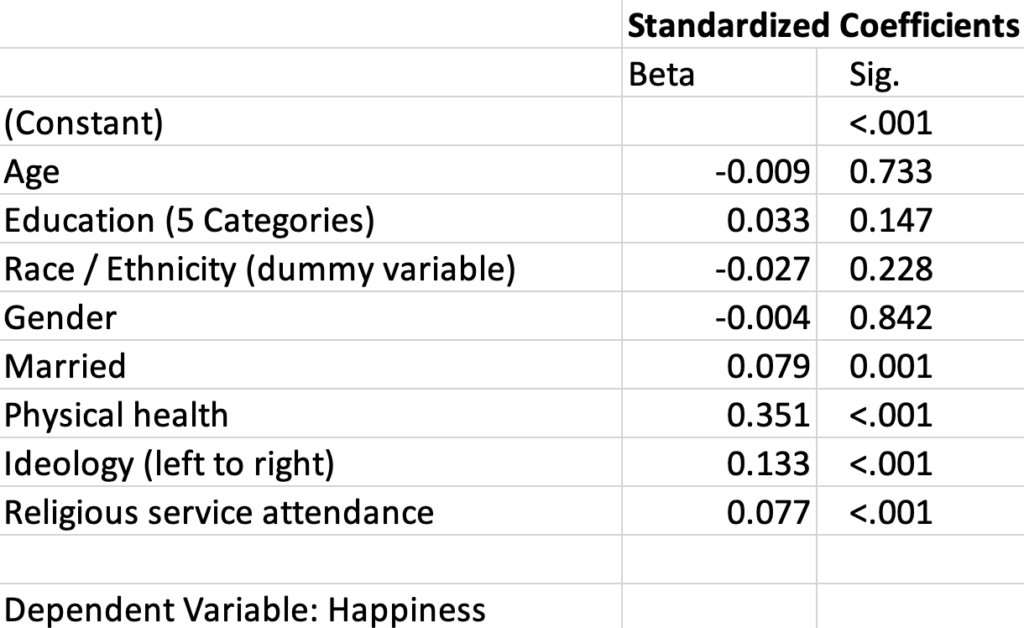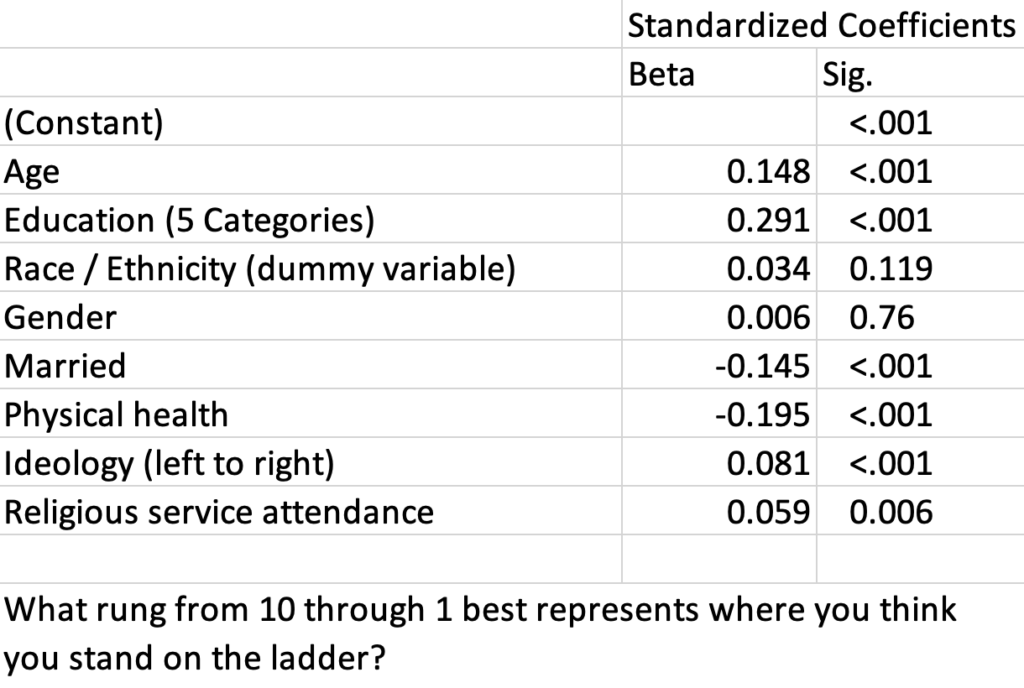- Facebook141
- Threads
- Bluesky
- Total 141
Musa al-Gharbi has written a review essay on “How to Understand the Well-Being Gap between Liberals and Conservatives.” He summarizes studies that show that conservatives are more likely than liberals/progressives to describe themselves as happy, and this relationship holds when one controls for demographics. In other words, conservatives do not report being happier because they are more advantaged; instead, a conservative who has the same social circumstances as a progressive is likelier to be happy. Al-Garbi says that this finding is consistent across countries and extends back in time.
1. Replicating the basic pattern: conservatism is associated with happiness.
I can’t independently vouch for his overview of the research, but I can confirm the main finding with data from Tufts’ 2022 Equity in America survey. We drew a representative sample of 1,831 Americans, with large subsamples of African Americans and Latinos to allow more precise estimates of racial/ethnic differences. We also collected an extraordinary number of measures about each respondent.
We asked, “Taken all together, how would you say things are these days? Would you say you are… Very happy, Pretty happy, or Not too happy.”
In a model with age, education, race and gender, more education and older age predict greater happiness. (We know from extensive research that the age curve is not linear; happiness dips in middle age. That pattern is invisible in a linear regression.) If I add marital status and a self-report of physical health, only those variables are significantly related to reported happiness. In other words, it looks as if older and better educated people are more likely to be married and in good health. Those factors then relate to happiness.
If I add ideology, it is also significant (p <.001), with more conservative people more likely to report being happy. If I also add religious attendance, it too is significant, and ideology stays signifiant. That implies that the ideology “effect” is not explained away by religiosity, but both matter. Here is that model. The last four variables are significant.

2. Could the explanation be progessives’ social awareness?
I think some progressives might say that they–and others on their side–are unhappy because they are rightly conscious of social injustices and dangers. Thus their unhappiness reflects social concern.
We can test this hypothesis to a limited extent with our survey. It includes a few relevant attitudinal questions along with many variables about life circumstances. I added the following four items to the above model:
- How bothered have you been witnessing someone in a public place being treated unfairly because of their race?
- How has the pandemic impacted your mental health?
- Thinking about climate change makes me feel anxious. [Agree/disagree]
- Someone [I] know has been unfairly stopped, searched, questioned, physically threatened or abused by the police. [Agree/disagree]
Except the climate question, each of these is related to unhappiness to a statistically significant degree. However, being liberal is still also related to being unhappy. That means that these specific concerns seem to accompany unhappiness but do not explain away the ideological “effect.” Or, to put it another way, someone who was not worried about these four specific things, but who identified as a liberal, would still be more likely than a conservative to be unhappy.
3. Could liberals display a negative bias?
A conservative might be inclined to see progressives as negatively biased rather than socially conscious. And there may be some evidence of that in our data. We also asked: “Imagine a ladder with 10 rungs (or steps). At the top of the ladder (rung #10) are the people who are the best off, those who have the most money, most education, and best jobs. At the bottom are the people who are the worst off, those who have the least money, least education, worst jobs, or no job (rung #1). What rung from 10 through 1 best represents where you think you stand on the ladder.”
I used that item as the dependent variable in place of self-reported happiness. Liberals/progressives rated themselves lower on the ladder compared to other people when I controlled for demographics. In other words, if a liberal and a conservative have the same education, race, gender, and age, the conservative will feel more fortunate. A critic might say that liberals are people who–regardless of their actual social positions–rate their own circumstances relatively poorly, and that attitude drives their ideology and makes them unhappy or else reflects their unhappiness.

4. People with depression cluster on the left.
However, there may be a different explanation. In our sample, 281 people say they have been diagnosed with depression. If I remove them from the sample and run the first of the two regressions shown above (the one with happiness as the dependent variable), ideology is no longer statistically significant. Now, only marriage, physical health, and race are related to happiness (with whites being more likely to report being happy).
We also asked how often in the past week people had felt depressed. I subtracted the 683 people who answered more than “rarely.” Running the model without those people generated a result in which only physical health was related to happiness. Ideology again ceased to be significant.
Finally, we asked people to rate their own mental health from poor to excellent. 272 said fair or poor. When I excluded that smallish group from the sample, ideology was still significant.
In a model based on the whole population, each of the mental health measures predicts unhappiness, and liberalism does as well. Those coefficients are compatible with two theories: either most conservatives are a bit happier than most liberals, regardless of depression, or else the average happiness of liberals is lower because they include some depressed people. By excluding those who report depression or a diagnosis of depression from the analysis, I find evidence that the latter is the case. In short: people with depression are reducing the mean happiness of liberals.
Indeed, people with depression cluster on the left. In the sample as a whole, 5% of respondents identify as extremely liberal, but 14% of the people who have been diagnosed with depression are extremely liberal. Conservatives represent 18.5% of the sample but just 11% of those with diagnosed depression. This pattern is consistent with previous studies.
Saying that you are depressed or reporting a diagnosis of depression depends on many factors–not only one’s mental health and access to medical care but also one’s beliefs and attitudes about psychology, which may relate to ideology. From our survey, it is not clear whether depressed people are concentrated on the left or whether people who employ the label of depression tilt that way.
However, my own informal observations and what I hear from others suggests that a substantial subset of people who gravitate to the left have significant mental health challenges, often related to trauma. I suspect that they explain most of the association between conservative ideology and happiness.
Everyone has a right to choose and express their political views. Progressives must welcome all kinds of people onto their side. However, I think that attracting people who (regardless of their social circumstances) experience depression poses a challenge for any movement.* Also, I sometimes wonder whether progressive messages fall flat because their authors are less happy than their target audiences.
*I wanted to know whether committed activists on the left were likely to be depressed, but we only have data from 31 left-oriented people who protested in the past year, which is too small a sample to tell. See also: how predictable is the rest of your life?; the aspiration curve from youth to old age; are Americans ‘innocent of ideology’?; party identification and ideology over time.